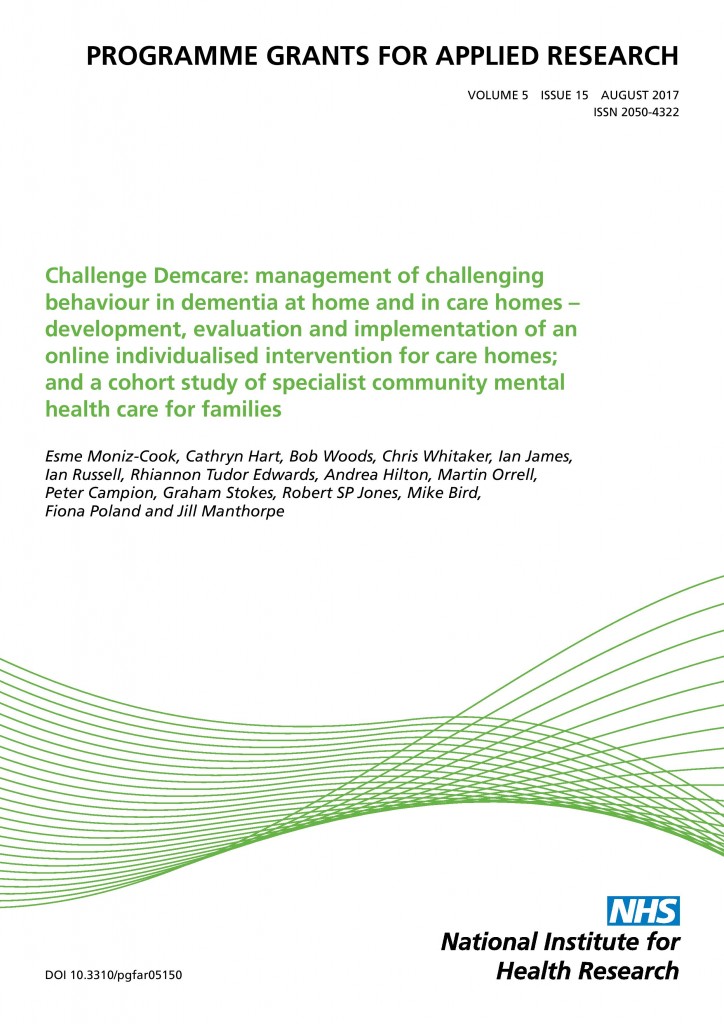Esme Moniz-Cook and Jill Manthorpe summarise the findings from a study on the management of dementia. (609 words)
- Help for family carers supporting people with dementia who are distressed is much needed but services struggle to provide effective responses
- Both families and care home staff need more support to help them to care for people with dementia – especially when the ‘going gets tough’
 The findings from a large research study on the Management of Dementia with clinically significant challenging behaviour at home and in care homes led by the University of Hull and Humber NHS FT are published today (11 August 2017). The research was funded by the National Institute for Health Research (NIHR), Programme Grants for Applied Research (PGfAR). The study examined the records of over 5,300 older people and their families who were referred for specialist help to NHS mental health services across England. Nearly two thirds (61%) of those with dementia and distressing behaviour had a mild dementia rather than severe dementia. Practitioners did not always recognise that people at this stage were experiencing problems such as agitation, aggression and distress; and over a six month period, they did not manage to reduce the difficulties faced by these families. Families bore most of the care costs, and many were untouched by the evidence, guidelines and scope that services should provide them with timely individually-tailored effective responses to their challenging circumstances.
The findings from a large research study on the Management of Dementia with clinically significant challenging behaviour at home and in care homes led by the University of Hull and Humber NHS FT are published today (11 August 2017). The research was funded by the National Institute for Health Research (NIHR), Programme Grants for Applied Research (PGfAR). The study examined the records of over 5,300 older people and their families who were referred for specialist help to NHS mental health services across England. Nearly two thirds (61%) of those with dementia and distressing behaviour had a mild dementia rather than severe dementia. Practitioners did not always recognise that people at this stage were experiencing problems such as agitation, aggression and distress; and over a six month period, they did not manage to reduce the difficulties faced by these families. Families bore most of the care costs, and many were untouched by the evidence, guidelines and scope that services should provide them with timely individually-tailored effective responses to their challenging circumstances.
A second strand of the study took place in over 63 care homes with 2,300 residents living in the Yorkshire and Humberside region. The research team offered online training and online therapist-assisted intervention to 632 care staff who were supporting 832 residents. Despite high levels of IT support and resources from a trained dementia therapist, care homes did not embrace online training or a system of individually tailored interventions. However, smaller care homes seemed more ready to take up online training and support. The research team developed a tool-kit for specialist care home liaison teams to assess the readiness of care homes to collaborate with such developments.
These in-depth studies of people with dementia and distressing or challenging behaviours living at home or in care homes also found that prescribing practices were sub-optimal in many instances.
Professor Esme Moniz-Cook, who led the research, said:
‘Older people with dementia in its early stages can be distressed, and sometimes help with this comes too late. Our programme of work developed simple screening tools to help practitioners detect such problems in both situations of family care and care homes. These can be used across primary and secondary care, to identify such problems and monitor the effectiveness of support over time. We have also developed evidence-based e-learning and toolkits for providers, such as care homes and NHS staff supporting them as well as hospital staff and community teams supporting families and people with dementia.’
Prof Jill Manthorpe added: ‘The majority of older people with dementia live at home – among them are people whose symptoms may be distressing to themselves and their families. Help can arrive too late. Our aspiration is to disseminate work from this programme to funders and providers. We need to shift the balance of primary, secondary and hospital practice from early diagnosis of dementia to early recognition of distressing behaviour and to support practitioners in health and care services to ensure that everyone can benefit from timely evidence-based care pathways.’
This summary has been prepared by Profs Moniz-Cook and Jill Manthorpe and does not necessarily reflect views or opinions of the NIHR, collaborating institutions, the NHS or the Department of Health.
Key Collaborators included King’s College London, and the universities of Bangor (Wales), East Anglia (UEA), Swansea (Wales), Nottingham and Bradford; Northumberland, Tyne and Wear NHS FT and BUPA.